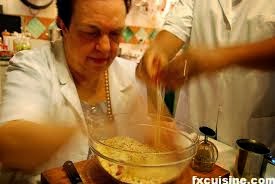 |
| Bar Vitelli: the Godfather's local |
A WOMAN with all the early morning menace
of the Godfather’s grandmother scowled us away from the entrance to the bar
where Al Pacino sat as a young man looking down on the Sicilian countryside.
Later after the lazy village church bell chimed 10, she made us frothy Cappuccinos and ice cold lemonade, and we sat in the sunshine and tried to
imagine Marlon Brando getting himself through the narrow doorway.
It is day two of our seven-day cruise on the Mediterranean. Already we have anchored and departed the Port of Naples, explored the sun baked hinterland of that wonderful crumbling living city, felt the hot breath of the gaping mouth of Vescuvio and visited the ancient city of Pompeii arrested almost perfectly on an ordinary day by the hot ash of a volcanic eruption 2000 years ago.
As our driver negotiated the narrow, corkscrew road that climbed to the village made famous in the Godfather, our guide gave us a potted history of the evolution of the Mafia – and as is often the way, the Mafia came into being in an attempt to address some of the injustices of the local socio-economic system. And well, things just got out of hand.
 |
| Mama Mia: TV cook Eleonora Consoli |
But today it’s Messina, the Sicilian port
city, the hill villages, memories of machine guns and Catholic weddings, and
Italy’s answer to Darina Allen. Eleonora Consoli is household name in Italy
beamed into homes on TV from her wonderful, old and thick walled simple kitchen
on the edge of a small Sicilian village, where she gives cooking lessons
day-on-day to tourists and local alike.
Wearing a white coat like an Irish hospital doctor, Eleonora, who could be the Godfather’s more benign grandmother, extols the virtues of olive oil and balanced diet. Delicious aromas waft from her kitchen but since we had not cooked, we would not eat. Instead, we pick up some very decent slices of pizza from a nearby deli and head home, to the Brilliance of the Seas.
There was a time when it was fashionable in Ireland to say
things like “I wouldn’t go on seven-day luxury cruise on the Mediterranean if
you paid me”. It was around the same time when nobody had money to take the
boat to Hollyhead to get away from the recession and until quite recently a
cruise was not high on the list of vacation options for most Irish people. That has changed, and Irish holidaymakers jaded with the Costas and long-haul
destinations are looking more and more at the all-in convenience of cruise
vacations close to home on the Mediterranean and further off in the Caribbean, and towards the cooler climes of Alaska and Iceland.
While on one hand, taking in three
countries (Italy, France and Spain) and six destinations (Rome, Naples, Sicily,
Florence, Nice and Barcelona) in seven days can seem a bit frenetic, in fact
the entire thing was quite relaxed. Even for those of us who just had to
disembark at every port and visit a bit of tourism terrorism on the local towns
and villages, there were two full sailing days where there was no option but to
take up a position midway between the pool and the cocktail bar.
Well, there were other options.
Rock-climbing, art auctions, cookery lessons, massage, dance lessons, the gym,
table tennis, the library or the solarium. For the younger cruisers there was a
crèche and a host of special activities.There is potentially so much to do on a short cruise like this one, that Royal Caribbean (the cruise company) publishes a newsletter every day outlining the day’s events. There are so many passengers – 2,000 in all – that dinner each evening in the massive dining room occurs in two sittings. On some evenings, dinner is a formal affair and the diversity of cultures and ethnicities on board is highlighted as passengers use this opportunity to show off their traditional formal wear on what becomes a kind of culinary, cultural catwalk.
For those jaded with the evening discipline of set dinner times, there is a large relaxed buffet area where the food is just as good and seemingly always available or it is possible to make a booking for the upmarket Italian restaurant, Portofino or the Chops Grille, steakhouse.
Eight hundred staff work tirelessly long hours to make the experience a special and relaxed one for every passenger on board. Children are liked and well tolerated, as are a diverse range of other people from Friends of Bill (a social support group for alcoholics) and Friends of Dorothy (a group of lesbian women and gay men who like to cruise).
 |
| Stunning: the Italian coastline |
Beside us in the bar one night was a large, extended Indian family of several generations living in diverse parts of the world, who had decided on this cruise for their five-year reunion. A new born baby borne on the shoulders of a number of the men as the night wore on, was oblivious to the stories of migration and relocation being traded over late Champagne.
Two sisters from Germany, one now living in
the United States and one in the South of France, were having their regular get
together on board. There were people recovering from illness (there are two
full-time doctors on board with a call out service) and people recovering from
broken hearts (there are a number of discos, cabaret shows and other
diversions). There were families and retired couples, honeymooners and a fair
few singles with an optimistic air about them.
And so it was, for one short week, a couple of thousand people using a luxury cruise liner to shrink their world to a manageable size and have some fun with family, friends and total strangers in the process.
